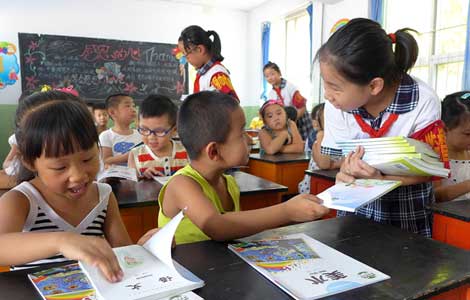School work: Chinese want less, US more
Updated: 2013-08-23 14:18
By Chen Weihua in Washington (China Daily)
|
||||||||
In what appears to be a switch, Americans say they want more pressure on children to work harder in school and Chinese say they want less.
That's the finding of a survey by the Pew Research Center's Global Attitudes Project, as reported in an article posted Thursday on its website by associated director Richard Wike.
Nearly two-thirds (64 percent) of 1,001 Americans surveyed say parents do not put enough pressure on children to do well in school. In China, a majority (68 percent) of 3,308 respondents said parents put too much pressure on their children to succeed in school, according to the 2011 survey. Among 21 nations polled in the survey, Americans showed the highest percentage of respondents saying more pressure should be applied on children.
Just 11 percent of Americans felt parents were putting too much pressure on their kids and 21 percent thought the amount of pressure was about right. According to the survey, the view that parents are not pushing their children hard enough was especially common among 30 to 49 year-olds, the age group most likely to have children under age 18.
The put-more-pressure-on-children response of Americans is the result of years of warnings about low test scores and underperforming schools, said Wike.
As for the Chinese response to the survey, Wike said he believes the Chinese education system's intense focus on test-taking has received a fair amount of attention in recent years, in particular the 2009 Program for International Student Assessment (PISA) exam. Shanghai students topped the rankings for math, science and reading.
"Apparently, many Chinese believed the long hours of test preparation were a bit too much," Wike said, citing OCED report which showed that 80 percent of Shanghai students have after-school tutoring.
Meanwhile, a Gallup poll of 1,001 Americans released on Wednesday said most believe that schools should teach "soft skills". More than three in four adults "strongly agree" that K-12 schools should teach critical thinking and communication to children, according to the poll.
And 64 percent of respondents strongly agree that goal setting should be taught, while 61 percent strongly agree that schools should know how to motivate students.
Christina Stouder, a Chinese teacher at Washington Latin Public Charter School who previously taught in central China's Hunan province, said she has seen a general trend for American schools to become a bit more Chinese, referring to the emphasis on test taking, while schools in China become a bit more American in stressing so-called quality education.
Quality education has been a hot topic among teachers and parents in China to turn students away from overemphasis on test-taking to a more comprehensive development through extra-curriculum activities and critical thinking skills training.
But progress has been slow due to the heavy pressure from preparing for the national college entrance exam. The score of the exam largely decides which college and university a student can attend.
"It's true that Chinese students have a lot more test takings than American students. But American students have more and more focus on test taking because of changes in the US school system," said Stouder, referring to the evaluation of teachers based on students' test scores.
However, Stouder does not think that American parents are calling for something as extreme as the schools in China.
"I think the parents at our school want their children to have very challenging curriculum and plenty of work. But there is not a call for more work. I think they had enough," she told China Daily on Thursday.
She acknowledged that she does not have the authority to force students to do homework during summer vacation, even though she would like them to review their Chinese classes. Only a few students are taking extra classes in summer trying to catch up, she said.
chenweihua@chinadailyusa.com
(China Daily USA 08/23/2013 page1)
Most Viewed
Editor's Picks

|

|

|

|

|

|
Today's Top News
McCain comments about Diaoyu draw fire
Chinese scientists asked to improve toilet
Bo Xilai denies bribery charges
Experts say police need guns on patrol
Nasdaq resumes stock trading
German mitten crabs not 'qualified for import'
Chinese netizens debate upping retirement age
Egypt's Mubarak leaves prison
US Weekly

|

|















